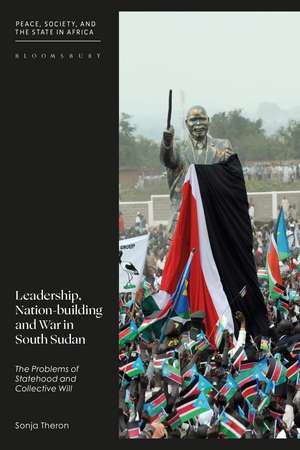Leadership, Nation-building and War in South Sudan: The Problems of Statehood and Collective Will: Peace, Society, and the State in Africa
Autor Sonja Theronen Limba Engleză Paperback – 29 iun 2022
| Toate formatele și edițiile | Preț | Express |
|---|---|---|
| Paperback (1) | 153.16 lei 3-5 săpt. | +15.52 lei 6-12 zile |
| Bloomsbury Publishing – 29 iun 2022 | 153.16 lei 3-5 săpt. | +15.52 lei 6-12 zile |
| Hardback (1) | 436.92 lei 6-8 săpt. | |
| Bloomsbury Publishing – 29 iun 2022 | 436.92 lei 6-8 săpt. |
Preț: 153.16 lei
Nou
Puncte Express: 230
Preț estimativ în valută:
29.31€ • 30.82$ • 24.22£
29.31€ • 30.82$ • 24.22£
Carte disponibilă
Livrare economică 27 martie-10 aprilie
Livrare express 12-18 martie pentru 25.51 lei
Preluare comenzi: 021 569.72.76
Specificații
ISBN-13: 9780755622139
ISBN-10: 0755622138
Pagini: 216
Dimensiuni: 156 x 234 x 21 mm
Greutate: 0.34 kg
Editura: Bloomsbury Publishing
Colecția Bloomsbury Academic
Seria Peace, Society, and the State in Africa
Locul publicării:London, United Kingdom
ISBN-10: 0755622138
Pagini: 216
Dimensiuni: 156 x 234 x 21 mm
Greutate: 0.34 kg
Editura: Bloomsbury Publishing
Colecția Bloomsbury Academic
Seria Peace, Society, and the State in Africa
Locul publicării:London, United Kingdom
Caracteristici
Core lessons for state-building in Africa and the developing world - moving the discourse past the usual ethnicity and religious factors
Notă biografică
Sonja Theron is a part-time lecturer in the Department of Political Sciences, University of Pretoria and a researcher at the Centre for Mediation in Africa, University of Pretoria, South Africa.
Cuprins
Introduction PART ONE: Origins: The Southern Sudan as People, Polity and "Problem" (c. 1821-1983) Conquest and Colonisation Independence and Rebellion PART TWO: The War Continues: The Fight for Nation and State (1983 - 2002) War and New Leadership Inner Turmoil PART THREE: Independence and Civil War: Building a State, Forgetting a Nation (2002 - 2015) Negotiating and Implementing Peace Freedom, Fragility and Fragmentation Conclusion
Recenzii
This is a remarkable book, providing a cogent analysis to a complex question about how a state that was born of a long history of war can graduate from political and social fracturing in order to forge a nation-state and a sense of collective nationhood. The book has advanced to a new level the debate about the role of political leadership in state-building and nation-building in Africa's newest country and filling an important gap in the literature on South Sudan. It is part political history, part sociology and largely deep ethnography about how people live with and overcome daunting ravages of more than half a century of vicious and devastating Sudanese state violence, fratricidal violence, and politico-military rivalries between the leaders. Sonja Theron has demonstrated how challenging and yet important it is to define such terms as "leadership", "political will" and "national identity" in their historical specificity and contingency. She convincingly argues that South Sudan is trapped between efforts to build a nation out of multitude of competing entities and the ambition by some groups, regions, and cultural identities to remain autonomous. The result is a brilliant expose of a long struggle for freedom that has now culminated in an independent state but being hamstrung by divisions that are rooted in that long history of conflict, violence and war. This book is a must read for anyone wishing to understand, not just this complex political and social history, but also the difficult question of whether South Sudan will survive as a viable nation.
This is an important contribution to scholarly work seeking to understand why South Sudan has been unable to build a nation that sustains peace. It also makes for stark reading for those working on peacebuilding efforts in the country and beyond. Theron skilfully interrogates South Sudan's chaotic and destructive leadership patterns and processes and how these have prevented any chance of peace. Her book untangles the complex realities of how nation and state-building efforts, whether in South Sudan or elsewhere are held hostage to the violent competing visions of a country's political elites. Theron's book comes at an opportune time in the arduous effort to secure a viable future for South Sudan after the painstakingly crafted 2018 peace agreement. Her insights are a reminder of what is at stake for this young country: if dangerously repetitive leadership patterns of relying on coercion, rewards and identity to create state and nationhood are not replaced with societal trust, mutuality, or collective responsibility - key ingredients for peacebuilding - fragmentation, violence and war will continue to mar the South Sudan's progress.
This is an important contribution to scholarly work seeking to understand why South Sudan has been unable to build a nation that sustains peace. It also makes for stark reading for those working on peacebuilding efforts in the country and beyond. Theron skilfully interrogates South Sudan's chaotic and destructive leadership patterns and processes and how these have prevented any chance of peace. Her book untangles the complex realities of how nation and state-building efforts, whether in South Sudan or elsewhere are held hostage to the violent competing visions of a country's political elites. Theron's book comes at an opportune time in the arduous effort to secure a viable future for South Sudan after the painstakingly crafted 2018 peace agreement. Her insights are a reminder of what is at stake for this young country: if dangerously repetitive leadership patterns of relying on coercion, rewards and identity to create state and nationhood are not replaced with societal trust, mutuality, or collective responsibility - key ingredients for peacebuilding - fragmentation, violence and war will continue to mar the South Sudan's progress.

